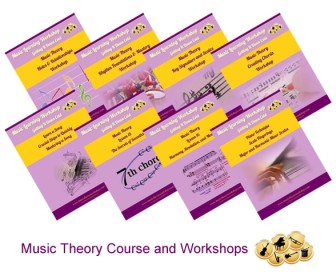Rhythm Subdividing in Two Part Beats
Here we will move into dividing beats into parts. We start with
-
Defining how we divide beats
-
How to count a divided beat.
-
Start with subdividing the beat by two. One beat gets two counts.
Previously you’ve probably become familiar with rhythm for straight beats. Then you explored what happens when we use notes which take up more than one beat. We also added rests to allow for silence as part of the rhythm. Now we move one more step toward our goal of mastery. So here’s a question.
What happens when we use eight notes on a quarter beat pattern? Wow, what a great question. Who asked that?
Let’s investigate going from half notes on 4/4 time to using eighth notes on that time signature.
Let’s review quarter and half note and whole note in 4/4 time.

Quarter notes take up one beat, half notes take up two beats, and the whole note takes up 4 beats.
Adding eighth notes
Now we add eighth notes. This is going to make us use two eighth notes (![]() ) for every quarter note (
) for every quarter note (![]() ). So we are going to need to expand our counting ability.
). So we are going to need to expand our counting ability.
The “AND” of Counting Rhythm
Introducing the “and” of counting. Sometimes shown as “&” or “+”. We will use the + sign to show this in our examples. We have to divide our beat into two parts. And this is where the + helps us. Look at this rhythm:

Our example is counted this way:
one and two and three and four and
(repeat a few times to get the hang of it)
What did we do? Well, we simply took the beat and made it two parts. Thus, we have the beat number and the + making up the full time count for one beat.
Practice on these rhythms
Be sure to count out load and start slowly:

Cross of the number ever time you complete five repeats (5x)
1 2 3 4 5 6 7

Cross of the number ever time you complete five repeats (5x)
1 2 3 4 5 6 7
The key to sub dividing beats is to know that counting a rhythm duple pattern with the “and” and to do it even when the other notes are longer.
Again this can be clearer once you apply this to an instrument. Audition these rhythm duple patterns and apply counting rhythm rests using a piano or other instrument.
Play a single note where shown, count slowly and hold where indicated. Do it several times and you will be able to count the rhythm duple pattern easily.


